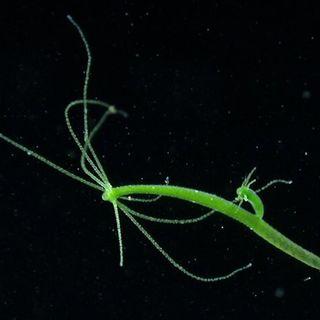2020 marked the beginning of a dystopian, almost apocalyptic age that has since gone on with seemingly no end in sight. With vaccination rates rising, we naively believed that we’re finally about to see the curtains drop on the coronavirus pandemic — until the Omicron reared its head up.
Seeing as we are probably caught in this crisis for a while longer, and existing protections are falling short, experts are looking for new ways to forge ahead.
To add to the problem, uncooperative pandemic behavior such as vaccine and mask-mandate protests have made matters worse. Scientists and public health practitioners are forced to develop innovative ways to enforce public safety, and they may have just found one of the most bizarre potential testing methods yet — Japanese scientists have developed masks that use ostrich antibodies to detect Covid19. How? By glowing in ultraviolet light. Really.
Yasuhiro Tsukamoto, a veterinary professor and the president of Kyoto Prefectural University in Japan, led a team of scientists who created “a mask filter coated with ostrich antibodies targeting the virus, based on previous research showing the birds had strong resistance to disease,” Reuters reported.
Then, the study participants were asked to wear the masks containing the filter for eight hours. Subsequently, “the filters were removed and sprayed with a chemical that glows under ultraviolet light if the virus is present. The filters worn by people infected with Covid19 glowed around the nose and mouth,” the report noted.
In fact, Tsukamoto detected the virus in his own system using the masks. The diagnosis was later confirmed by a standard test.
Related on The Swaddle:
Scientists Find Why Some People Test Negative for Covid19 Despite Exposure
At present, Tsukamoto and his team are working on developing the masks further so they can glow without the need for special lighting. “We can mass-produce antibodies from ostriches at a low cost… In the future, I want to make this into an easy testing kit that anyone can use,” he told reporters.
One of the biggest takeaways of this development is that people can have an option for simple, low-cost testing of the virus right at home.
But that’s not the only advantage the “glow-in-the-dark” masks have. They could serve as a non-invasive alternative to the painful — or, if one is fortunate, simply uncomfortable — experiences people have had with swab tests.
“I didn’t suspect it would trigger the worst headache I’ve ever had. I’ve had migraines for years, so I know… This felt exponentially worse, like a terrifying vise. Hours later, after over-the-counter pain medications didn’t even take the edge off, I let my husband call an ambulance,” writer Debbie Koenig narrated in a WebMD article.
Another individual, Hattey Lennerman, said, “I felt a sharp pain and my eyes watered. I wound up gripping the chair, reeling back from the pain.” In a subsequent test, her nose bled.
While these experiences may not resonate with everyone, wouldn’t it be nice if we could get tested for Covid19 without having our blood drawn, or a stranger shoving a giant earbud up our noses? I, for one, am certainly looking forward to non-invasive alternatives.




